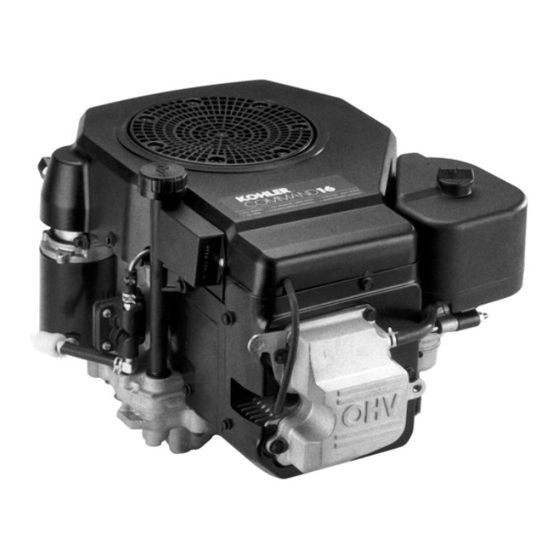Kohler COMMAND CV13 Benutzerhandbuch - Seite 7
Blättern Sie online oder laden Sie pdf Benutzerhandbuch für Motor Kohler COMMAND CV13 herunter. Kohler COMMAND CV13 17 Seiten. Vertical crankshaft
Auch für Kohler COMMAND CV13: Benutzerhandbuch (16 seiten), Benutzerhandbuch (16 seiten)

WARNING: Accidental Starts!
Before extending and checking retractable starter rope,
remove the spark plug lead to prevent the engine from
starting accidentally. Make sure the equipment is in
neutral.
For an Electric Start Engine – Activate the
starter switch. Release the switch as soon as the
engine starts.
NOTE: Do not crank the engine continuously for
more than 10 seconds at a time. If the
engine does not start, allow a 60 second
cool down period between starting
attempts. Failure to follow these
guidelines can burn out the starter motor.
NOTE: Upon start-up, a metallic ticking may
occur. This is caused by hydraulic lifter
leakdown during storage. Run the engine
for 5 minutes. The noise will normally
cease in the first minute. If noise
continues, run the engine at mid-throttle
for 20 minutes. If noise persists, take the
engine to your local Kohler Service outlet.
NOTE: If the engine develops sufficient speed to
disengage the starter but does not keep
running (a false start), engine rotation
must be allowed to come to a complete
stop before attempting to restart the
engine. If the starter is engaged while the
flywheel is rotating, the starter pinion and
flywheel ring gear may clash, resulting in
damage to the starter.
If the starter does not turn the engine over, shut
off starter immediately. Do not make further
attempts to start the engine until the condition is
corrected. Do not jump start using another battery
(refer to "Battery"). See your Kohler Engine
Service Dealer for trouble analysis.
3. For Operation – After the engine starts, move the
throttle/choke control from the "fast/choke on"
position and set the desired engine operating
speed (between the "slow" and "fast" position).
The engine/equipment may be operated during
the warm-up period, but it may be necessary to
leave the choke partially on until the engine warms
up.
Stopping
1. Remove the load by disengaging all PTO
attachments.
2a. For engines without a shutdown solenoid:
Move the throttle to the ''slow'' or ''low'' idle
position. Allow the engine to run at idle for 30-60
seconds; then stop the engine.
b. For engines equipped with a shutdown
solenoid: Position the throttle control somewhere
between half and full throttle; then stop the engine.
Battery
A 12 volt battery is normally used. Refer to the
operating instructions of the equipment this engine
powers for specific battery requirements.
If the battery charge is not sufficient to crank the
engine, recharge the battery (see page 12).
Operating
Angle of Operation
This engine will operate continuously at angles up
to 25°. Check oil level to assure crankcase oil level is
at the "F" mark on the dipstick.
Refer to the operating instructions of the equipment
this engine powers. Because of equipment design or
application, there may be more stringent restrictions
regarding the angle of operation.
NOTE: Do not operate this engine continuously at
angles exceeding 25° in any direction. Engine
damage could result from insufficient
lubrication.
Cooling
NOTE: If debris builds up on the grass screen or
other cooling air intake areas, stop the engine
immediately and clean. Operating the engine
with blocked or dirty air intake and cooling
areas can cause extensive damage due to
overheating.
WARNING: Hot Parts!
Engine components can get extremely hot from
operation. To prevent severe burns, do not touch these
areas while the engine is running–or immediately after
it is turned off. Never operate the engine with heat
shields or guards removed.
Engine Speed
NOTE: Do not tamper with the governor setting to
increase the maximum engine speed.
Overspeed is hazardous and will void the
engine warranty.
7
